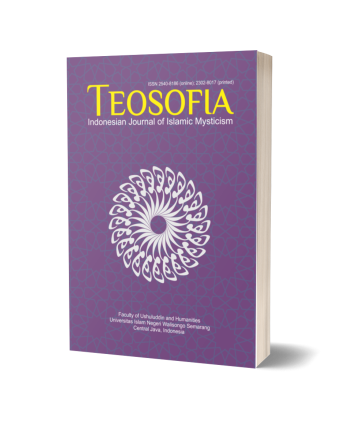Sufism and Interreligious Dialogue: The Naqshbandi Haqqani Sufi Order in Indonesia
DOI:
https://doi.org/10.21580/tos.v10i1.8459Keywords:
Sufism, Naqshabandi Haqqani, Religious Plurality, Interreligious Dialogue, ToleranceAbstract
Sufism plays a vital role in the process of spreading Islam in Indonesia, the key factor being inclusion and tolerance. Nowadays, the tolerant spirit of Sufi Islam is more and more challenged by certain intolerant Salafi groups. It seems that some Sufi groups in Indonesia have unfortunately adopted some of their attitudes and have become increasingly wary of other religions and unwilling to engage with them in a constructive dialogue. This negative trend creates tension within the Muslim community and in Indonesian society at large. After all, Indonesia is a country that is built on the principles of religious plurality. This article explores the teachings and practices of the Naqshbandi Haqqani Sufi order and their understanding of religious plurality. The study found that—despite the existing Salafi trend— the Naqshbandi shaykhs continue to praise religious plurality as one of God’s blessings. In their view, the sincere engagement in interreligious dialogue allows their followers to experience and actualize God’s Love. The Naqshbandi order also actively engages in interreligious dialogue with other communities in Jakarta and Kartasura.
Downloads
References
Abdullah, Muhammad Amin. “Islam Di Indonesia Atau Islam Indonesia (Studi Pergulatan Definisi Dan Jatidiri).” Jurnal Sosiologi Agama 9, no. 2 (2015): 1–28. https://doi.org/10.14421/jsa.2015.092-01.
Al-Haqqani, Shaykh Nazim. Defending Truth. London: Zero Productions, 1997.
Al-Qushayri, Abu al-Qasim. Al-Qushayri’s Epistle on Sufism. Translated by Alexander Knysh. United Kingdom: Garnet Publishing Limited, 2007.
Bruinessen, Martin van. Tarekat Naqsyabandiyah Di Indonesia: Survey Historis, Geografis Dan Sosiologis. Bandung: Mizan, 1992.
Howell, Julia Day. “Indonesia’s Salafist Sufis.” Modern Asian Studies 44, no. 5 (2010): 1029–51. https://doi.org/10.1017/S0026749X09990278.
———. “Sufism and the Indonesian Islamic Revival.” The Journal of Asian Studies 60, no. 3 (2001): 701–29. https://doi.org/10.2307/2700107.
Johns, Anthony H. “Sufizm as a Category in Indonesian Literature and History.” Journal of Southeast Asian History 2, no. 2 (1961): 10–23. https://doi.org/10.1017/S0217781100100547.
Kabbani, Mawlana Shaykh Hisham. “Real Interfaith Started with Prophet Muhammad (S).” Interfaith, 2013. https://sufilive.com/print/?id=4816&lc=EN.
———. “Sayyidina Ali: Four Characteristics of Perfection.” Interfaith, 2008. https://sufilive.com/Sayyidina_Ali_ra_Four_Characteristics_of_Perfection-1077-print.html.
———. “The Flowers of Unity: One God, One Love.” Interfaith, 2007. https://sufilive.com/The-Flowers-of-Unity-One-God-One-Love--148-EN-print.html.
Kabbani, Shaykh Muhammad Hisham. Classical Islam and the Naqshbandi Sufi Tradition. Washington DC: Islamic Supreme Council of America, 2004.
———. Keys to the Divine Kingdom. Washington DC: Islamic Supreme Council of America, 2006.
———. Pearls and Coral: Secrets of the Sufi Way. Washington DC: Islamic Supreme Council of America, 2005.
Khalil, Mohmmad Hassan. Islam and the Fate of Others: The Salvation Question. New York: Oxford University Press, 2012.
Laffan, Michael Francis. The Makings of Indonesian Islam : Orientalism and the Narration of a Sufi Past. Princeton Studies in Muslim Politics. Oxford, England: Princeton University Press, 2011.
Miichi, Ken. “Urban Sufi and Politics in Contemporary Indonesia: The Role of Dhikr Associations in the Anti-‘Ahok’ Rallies.” South East Asia Research 27, no. 3 (2019): 225–37. https://doi.org/10.1080/0967828X.2019.1667110.
Nazim, Maulana Shaykh. Love. Malaga: Sereseres Ediciones/Alejandro Jose Baudino, 2009.
Nielsen, Jorgen S., Mustafa Draper, and Galina Yemelianova. “Transnational Sufism: Haqqaniya.” In Sufism in the West, edited by Jamal Malik and John Hinnells. New York: Routledge, 2006.
Nugroho, Wahyu. “Keterlibatan Sosial Sebagai Sebuah Devosi: Sebuah Kesalehan Sosial Tarekat Naqshbandiyah Nazimmiyah.” Gema Teologi 39, no. 1 (2015): 33–56.
Simmons, Gwendolyn Zoharah. “Sufism and Its Response to Fundamentalism.” In Sufism and Social Integration, edited by Mohammad H. Faghfoory and Golam Dastagir. Chicago: ABC International Group. Inc, 2012.
“Über Das Leben Maulana Scheich Nazims.” In Der Morgenstern, n.d.
Downloads
Published
How to Cite
Issue
Section
License
Copyright
The copyright of the received article shall be assigned to the journal as the publisher of the journal. The intended copyright includes the right to publish the article in various forms (including reprints). The journal maintains the publishing rights to the published articles. Therefore, the author must submit a statement of the Copyright Transfer Agreement.*)
Licensing

This work is licensed under a Creative Commons Attribution-ShareAlike 4.0 International License.
In line with the license, authors are allowed to share and adapt the material. In addition, the material must be given appropriate credit, provided with a link to the license, and indicated if changes were made. If authors remix, transform or build upon the material, authors must distribute their contributions under the same license as the original.
_______
*) Authors whose articles are accepted for publication will receive confirmation via email and send a Copyright Transfer Agreement.










